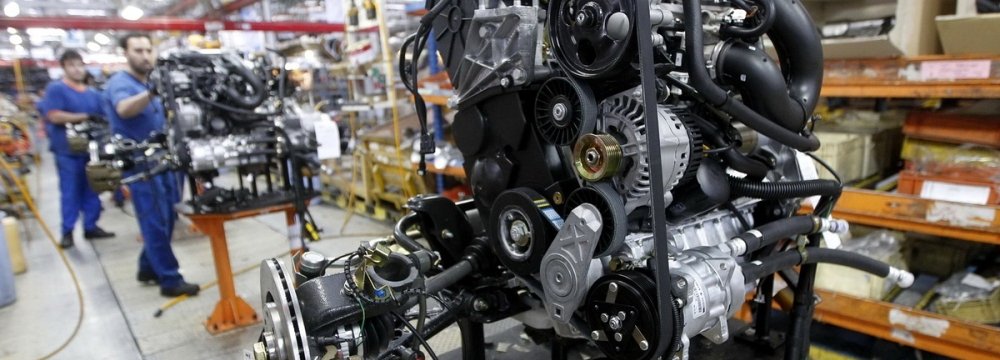
Domestic Auto Parts Makers Averse to IKCO-Peugeot Deal

Censuring IKCO’s lack of transparency about its deal with the French carmaker, the secretary of Iran Auto Parts Manufacturers Association, Maziar Beiglou said, “IKCO expects suppliers to pay for the auto parts molds. Domestic moldmakers are reluctant to make the investment,” Donya-e-Eqtesad, the sister publication of Financial Tribune reported.
IKCO and Groupe PSA’s Peugeot brand signed a €400-million deal in June 2016. Through the 50-50 joint venture they call Iran Khodro Automobiles Peugeot (IKAP), three models, namely Peugeot 208, 2008 and 301 are to be manufactured in Iran.
As per the agreement, Peugeot has agreed to use locally manufactured parts in its cars made in Iran. The so-called ‘localization clause’ stipulates that at least 40% of the vehicle parts should be manufactured inside the country.
While government officials and domestic automakers often stress that localization is a key policy to help the country develop as a modern carmaker rather than just assembler of imported parts, local parts makers have never been included in negotiations with foreign auto companies wanting to produce in Iran.
Beiglou says, “So far, IKCO has kept auto part makers in the dark about details of its deal with Peugeot.”
In his opinion, suppliers should be abreast about the agreements and their details so they can prepare a strategy for investment and production.
According to Beiglou, the lack of transparency has made suppliers reluctant to pay for the molds “simply because they are not certain whether the investment would be feasible and profitable.”
In addition to local carmakers indifference towards suppliers’ demands, local parts makers have been grappling with numerous problems including lack of liquidity and high-interest rates on bank loans.
Lack of liquidity to some extent is due to the failure of local car manufacturing companies to repay their debts to the parts makers. Reports indicate that Iran’s largest automakers IKCO and SAIPA owe local parts manufacturers $2.4 billion.
Furthermore, local production of spare parts exceeds demand due to low import tariffs on cheap and low-quality parts brought from China. As such, companies from India and some other countries have been able to grab a significant share of the market.
With the Industries Ministry acting as a mediator, IAPMA and IKCO are holding talks to find a way to address the problem.
Unfeasible Output Rate
Local automakers and their affiliates often say low production rates render localization impractical and unfeasible.
Industry insiders are of the opinion that most foreign vehicles assembled in Iran simply do not reach the minimum rollout rate that is over 100,000 units per year. They say production rates do not reach the feasibility threshold, so localization and manufacturing auto parts in the country is not cost effective.
Stressing the main dispute the director of a local auto parts manufacturing company says, “Hardly 16,000 units of Peugeot 2008 are to be assembled through the JV in the first year.”
The model is the first vehicle to be produced/assembled through the IKCO-Peugeot joint venture.
Speaking on condition of anonymity with the Persian-language newspaper Donya-e-Eqtesad, the head of the company said, “Considering the low production rate, purchasing molds for Peugeot 2008 parts are not and will not be feasible.”
This is not the first time that the extended delays in implementing the IKCO-Peugeot deal are being castigated in business circles and sections of the mass media. The executive vice president of Groupe PSA for Africa and the Middle East Jean-Christophe Quémard recently told the head of Industrial Development and Renovation Organization of Iran, Mansour Moazzemi, “Lack of investments for purchasing and importing auto parts is impeding Peugeot operations in the country.”
According to sources familiar with the deal, IKCO has failed to put up the money for importing auto parts for the new car.
Quémard said, “Peugeot auto parts are stuck in the customs. This is not an uncommon incident in the global industry. The problem will be solved soon. But for the time being, the problem has hampered Peugeot operations in Iran.”
It is worth mentioning that IKCO started the presale of Peugeot 2008 months ago, for the registration of which 16,000 car buyers paid a deposit of 600 million rials ($15,000) each. According to statistics released by the Ministry of Industries, so far only four units of the vehicle have been produced.
While many hoped that automotive collaboration with foreign companies can and should be able to pull Iran’s dormant auto industry out of stagnation, once again local carmakers’ unprofessional and negligent ways are hindering not helping the government’s policy to give the auto industry a new lease of life.


Gold price edges up as market awaits Fed minutes, Powell speech

Glencore trader who led ill-fated battery recycling push to exit

Emirates Global Aluminium unit to exit Guinea after mine seized

UBS lifts 2026 gold forecasts on US macro risks

Iron ore price dips on China blast furnace cuts, US trade restrictions

Roshel, Swebor partner to produce ballistic-grade steel in Canada

EverMetal launches US-based critical metals recycling platform

US hikes steel, aluminum tariffs on imported wind turbines, cranes, railcars

Afghanistan says China seeks its participation in Belt and Road Initiative

First Quantum drops plan to sell stakes in Zambia copper mines

Ivanhoe advances Kamoa dewatering plan, plans forecasts

Texas factory gives Chinese copper firm an edge in tariff war

Pan American locks in $2.1B takeover of MAG Silver

Iron ore prices hit one-week high after fatal incident halts Rio Tinto’s Simandou project

US adds copper, potash, silicon in critical minerals list shake-up

Barrick’s Reko Diq in line for $410M ADB backing

Gold price gains 1% as Powell gives dovish signal

Electra converts debt, launches $30M raise to jumpstart stalled cobalt refinery

Gold boom drives rising costs for Aussie producers

First Quantum drops plan to sell stakes in Zambia copper mines

Ivanhoe advances Kamoa dewatering plan, plans forecasts

Texas factory gives Chinese copper firm an edge in tariff war

Pan American locks in $2.1B takeover of MAG Silver

Iron ore prices hit one-week high after fatal incident halts Rio Tinto’s Simandou project

US adds copper, potash, silicon in critical minerals list shake-up

Barrick’s Reko Diq in line for $410M ADB backing

Gold price gains 1% as Powell gives dovish signal

Electra converts debt, launches $30M raise to jumpstart stalled cobalt refinery
















